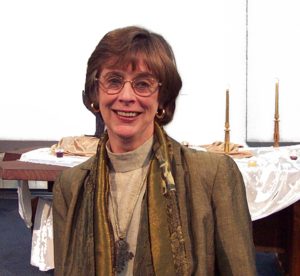Twenty-Second Sunday after Pentecost (Proper 24), 21 October 2018
October 21, 2018 | by Marjorie Suchocki
| Reading 1 | Reading 2 | Reading 3 | Reading 4 | Reading 1 Alt | Reading 2 Alt |
|---|---|---|---|---|---|
| Job 38: 1-7 (34-41); Psalm 8 | [Psalm 104:1-9, 24, 35c] | [Hebrews 5:1-10] | [Mark 10:35-45] |
Job: Faith in Tough Times
Job 38: 1-7 (34-41); Psalm 8*
NOTES:
- If you choose to preach from Job, It is essential that you first re-read the entire book. Each lectionary text requires its full context.
- I have Psalm 8 to the lectionary reading for this week.
At last God speaks! The whirlwind comes, and out of the darkness and the fear comes the answer to Job — AND to the three comforters. But instead of being an explanation of all that has gone wrong, instead of being a bland recounting of the first chapter of Job. . . some “well you see, I was up there on my throne, and this party-crasher came in and one thing led to another and then. . .” there is no explanation at all. Instead, we are given an astonishing revelation of this Redeemer who lives, and who is fearful and magnificent at the same time. From the whirlwind comes the query to Job, to the three comforters, and to all of us as well: “Who are you that darkens counsel by words without knowledge?” With just these few words, all those previous explanations and complaints are swept away, consumed by the whirlwind.
In a sense, this is the ultimate answer to the prosperity gospel preached by those would-be comforters. You think existence is a neat correlation between “live the way I think you should live,” “follow the politics I think you should follow,” “join the religion I think you should join,” and when you do thus and so, whatever that thus-and-so may be, only good things will happen to you! We are finite and fragile, we make mistakes as individuals and as society — it’s John Wesley who said in A Plain Account of Christian Perfection that “It is as natural to make a mistake as to breathe, and we can no more live without the one than without the other.” Because we are finite, our knowledge — even our beautifully crafted theologies — are human products that reflect our own cultures and times, even as we do our very best “to give an account of the hope that is within” (1 Peter 3:15). Faith works with our creeds, is expressed in our creeds, but faith is deeper than our creeds. Faith is not in our creeds, but in the God whom our creeds imperfectly try to express. We are finite, which means that “now we know in part,” as Paul says in 1 Corinthians 13. Our finite intellects are subject to error, and our faith must be deeper than that. We must listen to the call from the whirlwind: “Who are you that darkens counsel by words without knowledge,” and tremble.
The revelation continues by putting us in our place. “Where were you when I laid the foundations of the earth! Tell me, if you have understanding. Who set its measurements, since you know? Or who stretched the line on it? On what were its bases sunk? Or who laid its cornerstone?” The words make all the pious and misinformed talk of the comforters and even Job shrink to insignificance. How do we dare instruct another on just what God thinks about thus and so? Through faith and indeed through the sciences we do our best to follow the footsteps of God, to penetrate the secrets of the universe, as well we should. But do not dare to castigate another if they disagree with our own interpretation of such wonders. Do not dare to assume that we alone, above all others, have the keys to the mysteries of existence.
If such thoughts leave us trembling, this particular section of the voice from the whirlwind suddenly couches the words with singular and stunning beauty: “tell me . . . who laid its cornerstone, when the morning stars sang together, and all the sons of God shouted for joy?!” It’s the sheer poetic beauty that addresses us from the whirlwind, pulling us into its swirling power, so that finally our reason is stilled, and we simply join the chorus of the morning stars, and shout for joy.
Marjorie Hewitt Suchocki is Professor Emerita, Claremont School of Theology, Faculty Co-Director Emerita of the Center for Process Studies, Director Emerita of Process and Faith, and the founder and former Director of the Common Good International Film Festival (formerly, Whitehead International Film Festival). Among her many books are God Christ Church: A Practical Guide to Process Theology; The End of Evil: Process Eschatology in Historical Context; The Whispered Word: A Theology for Preaching; In God’s Presence: Theological Reflections on Prayer; and Through a Lens Darkly: Tracing Redemption in Film.

